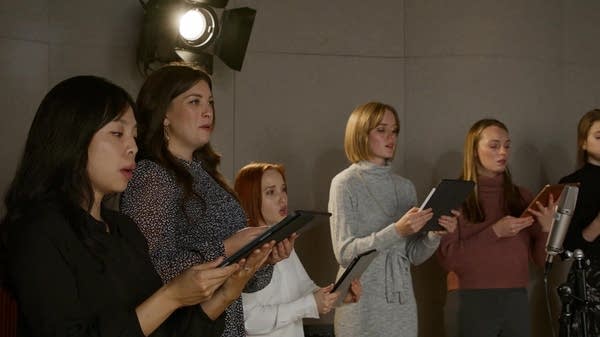Each week, we answer "frequently asked questions" about life during the coronavirus crisis. If you have a question you'd like us to consider for a future post, email us at goatsandsoda@npr.org with the subject line: "Weekly Coronavirus Questions."
My choir director says that the pandemic is ending soon and that face-to-face, in-person practice is expected to begin in May. Is it true that vaccinated people can safely sing together? Should people still be wearing masks?
Singing indoors is one of the riskiest things you can do during this pandemic -- up there with screaming for your March Madness picks in a packed arena. When you sing or scream, you expel air forcefully, which generates lots of respiratory aerosols that can contain SARS-CoV-2, the virus that causes COVID-19.
We all remember that haunting episode from the early days of the pandemic in which 52 of 61 members at a choir rehearsal in Skagit County, Wash., got confirmed or probable cases of COVID-19 after a 2 1/2-hour practice. Three choir members were hospitalized, and two died.
But the vaccines are powerful tools. So, for advice, we tapped one of the co-authors of the International Coalition of Performing Arts Aerosol Study, University of Maryland mechanical engineering professor Jelena Srebric, and Dr. Jill Weatherhead, assistant professor of adult and pediatric infectious diseases at Baylor College of Medicine.
After Srebric had a good chuckle about the choir director's pronouncement that the pandemic is almost over (as much as we may wish, we're not quite there), she explained the study's most recent guidelines, released in December will hold true for a while -- even with the additional protection from vaccines. Here's a summary:
1. Masks should be worn by choir members and anyone playing an instrument. (Cutting a slit in your mask with an X-Acto knife allows you to fit it over a wind instrument.)
2. Practice outdoors if possible. If indoors, the choir director should make sure there's a good air filtration system.
3. Singers should be at least 6 feet apart. Practice no more than 30 minutes at a time. The idea is to move away from plumes of air created from singing.
As vaccines become more widely available, Srebric suggests asking as many members to get them as soon as they're eligible.
"Vaccination reduces the risk [of infection] dramatically, especially for vaccinated people, but we still don't have a clear picture on what is going to happen with variants," Srebric explains. "So, it's very prudent to continue to be cautious."
That's why she suggests sticking to the above guidelines even once most of your choir is vaccinated. Instead of changing your habits when you get vaccinated, she suggests changing your thinking: "The vaccine gives you peace of mind," she says. "You can keep the same precaution measures but not worry as much as people used to worry."
Choirs could also wait to resume in-person practice — and definitely performances with audiences — until more people are vaccinated, Weatherhead points out. "Wait until the community transmission comes down. That is the safest plan."
But don't despair that you will have to follow these rules forever. Real-world studies suggest that vaccines may be efficacious against transmission from asymptomatic cases. "That was one of the biggest unknowns because the clinical trials didn't study that," she says.
And an observational study published in Nature showed that the small percentage of people who got infected after a vaccine tended to have much lower viral loads than unvaccinated people who got infected, providing further evidence that the ability to transmit the disease likely diminishes with vaccination.
As more people get vaccinated, choirs should be able to start gradually shifting their protocols, Srebric notes. For example, choirs could practice longer and shorten the breaks, she says.
And yes, all of this also applies to screaming at big concerts and sporting events. But feel free to cheer as much as you like for the UConn Huskies from the privacy of your couch on Friday night!
Sheila Mulrooney Eldred is a freelance health journalist in Minneapolis. She's written about COVID-19 for many publications, including Medscape, Kaiser Health News, Science News for Students and The Washington Post. More at sheilaeldred.pressfolios.com. On Twitter: @milepostmedia
Pranav Baskar is a freelance journalist who regularly answers coronavirus FAQs for NPR.
Copyright 2021 NPR. To see more, visit npr.org.
Love the music?
Show your support by making a gift to YourClassical.
Each day, we’re here for you with thoughtful streams that set the tone for your day – not to mention the stories and programs that inspire you to new discovery and help you explore the music you love.
YourClassical is available for free, because we are listener-supported public media. Take a moment to make your gift today.









